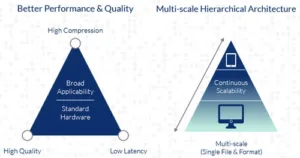A UK company called V-Nova claims to have developed a new compression technology offering between two- and three-times bitrate savings in video streaming, compared to codecs such as H.264, HEVC and JPEG2000.
‘Perseus’ has been adopted by more than 20 companies and organisations so far, including the EBU, Hitachi, Intel and Broadcom. It is currently being offered in the form of appliances, embedded software and codec plug-ins. A major advantage, says V-Nova, is the enabling of live UltraHD broadcast at HD bitrates (as well as HD at SD bitrates and SD at audio bitrates). HD video can be streamed over mobile networks.
According to the BBC, the technology will initially be deployed to the USA and ‘several’ European countries this summer, with UK companies introducing it later this year.
Analyst Comment
We spoke to Fabio Murra at V-Nova to get a bit more background to this story. V-Nova was a surprise to us, but we heard that the firm has been in stealth mode, so we weren’t quite so annoyed that we had missed what it is doing.
We established that the new technology is a new codec that takes a different approach to the issue. Rather than the block-based approach used by codecs such as HEVC, Perseus, the name the company gives to its codec, exploits the parallelism that is possible in a lot of the current chip architectures, but is not generally well exploited. That’s as far as Murra would go in explaining what the firm is doing, for now. When we first heard the news, we wondered if Perseus was related to the pre- and post-processors that some companies have developed that sit either side of standard codecs, but no, it is a real codec. In fact, it can exploit pre-processors as well.
According to the BBC report, the codec can deliver UltraHD in as little as 7-8Mbits – if this is accurate, it would be an amazing performance and would explain the support of the EBU (which looks after the interests of public service broadcasters in Europe and this community hates having to upgrade hardware, if it can avoid it). Murra assured us that the codec supports DVP and other transports such as MPEG-Dash.
Because the company has been working for some time with chip companies including Intel and Broadcom, the codec can be used with some current generation chips and V-Nova has a range of software plug-ins and add-ons to enable it on existing hardware – a big advantage if the alternative (required if you switch to HEVC) is to have to swap out or upgrade a lot of STBs or other devices.
V-Nova has also been working on the encoding side of the equation and confirmed to us that it is able to support real time encoding, but as with all new codecs, it believes it is some way from the optimum tuning of the codec.
The company has an ip-licensing business model and told us that it is flexible in considering different licensing models based on one off or unit-related deals. (BR)

